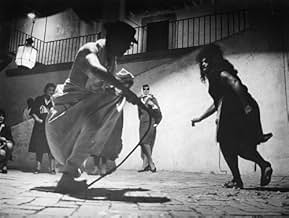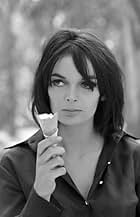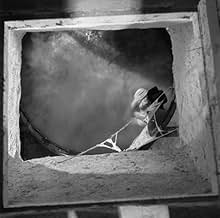Um diretor de cinema atormentado se retira para suas memórias e fantasias.Um diretor de cinema atormentado se retira para suas memórias e fantasias.Um diretor de cinema atormentado se retira para suas memórias e fantasias.
- Ganhou 2 Oscars
- 19 vitórias e 9 indicações no total
Anouk Aimée
- Luisa Anselmi
- (as Anouk Aimee)
Eddra Gale
- La Saraghina
- (as Edra Gale)
Enredo
Você sabia?
- Curiosidades8½ (1963) was shot, like almost all Italian movies at the time, completely without sound recording on set. All dialogue was dubbed during post production. Federico Fellini was known for shouting direction at his actors during shooting, and for rewriting dialogue afterwards, making a lot of the dialogue in the movie appear out-of-sync. (Source: High-def Digest)
- Erros de gravaçãoWhen Guido visits the cardinal in the mud bath, the cardinal is sitting in a chair, fully dressed in his cassock, as two attendants use a sheet to form a curtain around him; however, as the camera cuts to a closer angle, the cardinal is suddenly undressed to the waist.
- Citações
Claudia: I don't understand. He meets a girl that can give him a new life and he pushes her away?
Guido: Because he no longer believes in it.
Claudia: Because he doesn't know how to love.
Guido: Because it isn't true that a woman can change a man.
Claudia: Because he doesn't know how to love.
Guido: And above all because I don't feel like telling another pile of lies.
Claudia: Because he doesn't know how to love.
- Versões alternativasIn the American theatrical release version, Rodgers & Hart's "Blue Moon" can be heard twice: the first time, when it's played by strolling strings near the shopping plaza where Guido meets up with his wife, Luisa; the second time, when Guido goes out for a drive with the "real" Claudia. However, in the original Italian release, the song played in both scenes is "Sheik of Araby." The Criterion laserdisc features "Blue Moon," but it's "Sheik of Araby" on the DVD, possibly due to the use of different source materials.
- ConexõesEdited into Bellissimo: Immagini del cinema italiano (1985)
Avaliação em destaque
What can anyone say about this film? It's one of a kind, and simple words can't really describe it.
The famous Italian director Federico Fellini presents us the journey of the highly surrealistic thoughts of a filmmaker, who suffers from, what we could call, Director's block. The protagonist, who seems constantly tired, is surrounded by many different people, friends, associates, priests and mostly... women; struggling with his weird fantasies of the current events of his life and memories of his childhood. All of these scenes take place in many different phantasmagoric sets, where multiple, for the most part random, conversations occur simultaneously, making him continually engaged and, in a way, frustrated.
The production design is exceptional, with huge sets and dreamlike settings, while the cinematography (Fellini's last black and white film) is very unique and teases the viewer with alternate focusing and artsy compositions. The music theme is for the most part classical symphonies from Tchaikovsky, Wagner and Chopin, beautifully edited with the rhythm of the film.
This is a drama with many subtle doses of comedy and a surreal analysis of the thoughts, relationships, affairs, fears, dreams and memories of the protagonist. Some viewers can find a bit annoying the randomness of the script and editing, where mostly unexplained things occur, but others can completely immerse in this insane trip and fully enjoy it.
If you've seen some movies of Charlie Kaufman, a good explanation of what to expect is a wedding between Adaptation and Synecdoche, New York. If you haven't seen any of those, then you can go ahead and experience something you've never had before!
The famous Italian director Federico Fellini presents us the journey of the highly surrealistic thoughts of a filmmaker, who suffers from, what we could call, Director's block. The protagonist, who seems constantly tired, is surrounded by many different people, friends, associates, priests and mostly... women; struggling with his weird fantasies of the current events of his life and memories of his childhood. All of these scenes take place in many different phantasmagoric sets, where multiple, for the most part random, conversations occur simultaneously, making him continually engaged and, in a way, frustrated.
The production design is exceptional, with huge sets and dreamlike settings, while the cinematography (Fellini's last black and white film) is very unique and teases the viewer with alternate focusing and artsy compositions. The music theme is for the most part classical symphonies from Tchaikovsky, Wagner and Chopin, beautifully edited with the rhythm of the film.
This is a drama with many subtle doses of comedy and a surreal analysis of the thoughts, relationships, affairs, fears, dreams and memories of the protagonist. Some viewers can find a bit annoying the randomness of the script and editing, where mostly unexplained things occur, but others can completely immerse in this insane trip and fully enjoy it.
If you've seen some movies of Charlie Kaufman, a good explanation of what to expect is a wedding between Adaptation and Synecdoche, New York. If you haven't seen any of those, then you can go ahead and experience something you've never had before!
- amaklp
- 20 de dez. de 2019
- Link permanente
Principais escolhas
Faça login para avaliar e ver a lista de recomendações personalizadas
Detalhes
- Data de lançamento
- Países de origem
- Centrais de atendimento oficiais
- Idiomas
- Também conhecido como
- Eight and a Half
- Locações de filme
- Tivoli, Roma, Lazio, Itália(location)
- Empresas de produção
- Consulte mais créditos da empresa na IMDbPro
Bilheteria
- Faturamento bruto nos EUA e Canadá
- US$ 98.760
- Fim de semana de estreia nos EUA e Canadá
- US$ 11.947
- 11 de abr. de 1999
- Faturamento bruto mundial
- US$ 200.502
- Tempo de duração2 horas 18 minutos
- Cor
- Mixagem de som
- Proporção
- 1.85 : 1
Contribua para esta página
Sugerir uma alteração ou adicionar conteúdo ausente






































